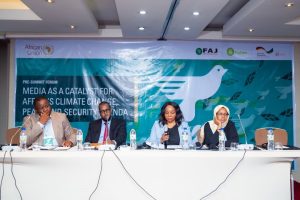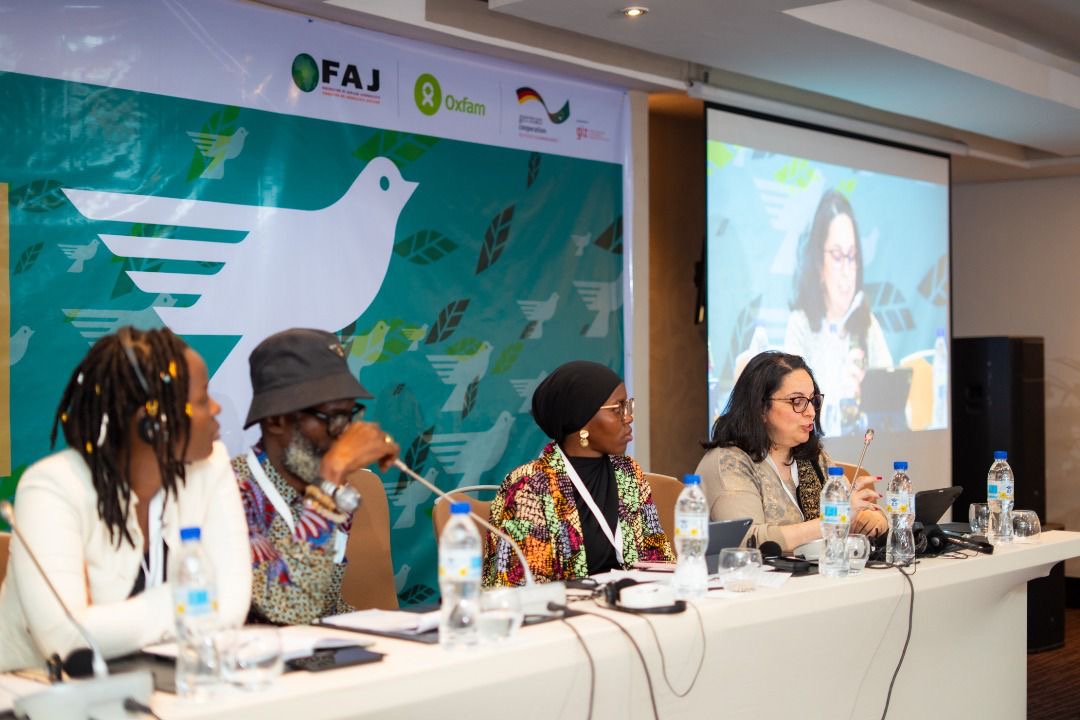Gambiaj.com – (Banjul, the Gambia)- African journalists have been urged to place journalism at the centre of Africa’s climate, peace and security agenda as the continent prepares to present its Common African Position at the COP30 climate summit in Brazil.
The call came during a high-level pre-forum in Addis Ababa, held ahead of the Second African Climate Summit ACS2).
The event was co-convened by the African Union Commission’s Department of Political Affairs, Peace and Security and the Federation of African Journalists, with support from Oxfam and German Development Cooperation (GIZ).
It brought together more than 40 journalists, policymakers and civil society representatives from across Africa under the theme “Media as a Catalyst for Africa’s Climate Change, Peace and Security Agenda: Driving Just Transition and Climate Justice.”
Speakers underscored that Africa contributes the least to global greenhouse gas emissions but suffers the greatest consequences of climate change. Prolonged droughts in Somalia, desertification in the Sahel, the shrinking of Lake Chad and devastating floods in Libya were cited as clear examples of how environmental shocks intersect with poverty, weak governance and conflict.
 Dr. Richard Muyungi, Chair of the African Group of Negotiators on climate change, stressed that trusted information can make the difference between crisis and resilience. “Journalists are central to this effort. When information is trusted and timely, it can reduce tensions, guide early action and support fair policies,” he said.
Dr. Richard Muyungi, Chair of the African Group of Negotiators on climate change, stressed that trusted information can make the difference between crisis and resilience. “Journalists are central to this effort. When information is trusted and timely, it can reduce tensions, guide early action and support fair policies,” he said.
Building on this, the African Union reminded participants that journalism is indispensable to Africa’s response to the climate–peace–security nexus.
Representative of the Commissioner for Political Affairs, Peace and Security Ambassador Bankole Adeoye, Dr. Philip Attuquayefio said the media cannot be treated as bystanders.
He explained that journalism shapes narratives, amplifies the voices of the most vulnerable and holds leaders accountable, adding that societies are stronger and safer when journalists are empowered to provide accurate information in the public interest.
The Federation of African Journalists used the platform to highlight its Action Plan on climate justice and just transition, which commits to mobilising journalists to track climate finance, uncover harmful practices, and ensure that vulnerable groups are not excluded from the transition. FAJ President Omar Faruk Osman noted that journalists are often the first to document climate shocks.
“Journalists are documenting crises in real time, often at personal risk. This forum invests in their safety and skills so they can tell accurate stories, challenge harmful narratives and support solutions that build peace, security and resilience,” he said.
The International Federation of Journalists reinforced this message with a pledge of solidarity to its African members. General Secretary Anthony Bellanger described media freedom and public-interest reporting as crucial to accountability.
“Media freedom and public-interest reporting help hard-hit communities understand risk, set priorities and hold leaders accountable for climate decisions. Journalists ensure that adaptation plans, efforts to tackle climate insecurity and just transition policies do not leave workers or vulnerable groups behind,” he said, affirming IFJ’s full support for FAJ’s climate agenda.
International partners echoed the importance of the media’s role in amplifying Africa’s voice. The European Union’s representative, Pascal Delisle, observed that the rise of disinformation poses serious risks, making accurate reporting more important than ever. He assured that the EU would continue to back African journalists as reliable partners in advancing climate, peace and security priorities, especially as the AU–EU partnership marks its 25th anniversary.
Supporting partners Oxfam and GIZ also reaffirmed their commitment to strengthening African journalism. Elise Nalbandian, Head of Oxfam’s African Union Liaison Office, emphasised that journalists are key to shaping public understanding and political will.
She explained that the media can highlight disproportionate impacts, demand accountability, and showcase solutions that inspire action across the continent.
Similarly, Rebecca Minkus of GIZ said the organisation will continue to support African voices, pointing to its partnerships with both the AU and African journalists as vital to building resilience and amplifying trusted information.
Over the course of two days, participants engaged in in-depth discussions to address contentious issues and to shape a declaration ahead of COP30.
The Addis Ababa pre-forum agreed on several outcomes, including the development of editorial standards for reporting on climate, peace and security, the establishment of a continental journalists’ network; expanded investigative reporting on climate finance and scaled-up safety and capacity-building programmes for reporters.
As discussions closed, delegates reaffirmed that Africa’s climate story must be told by Africans themselves.










